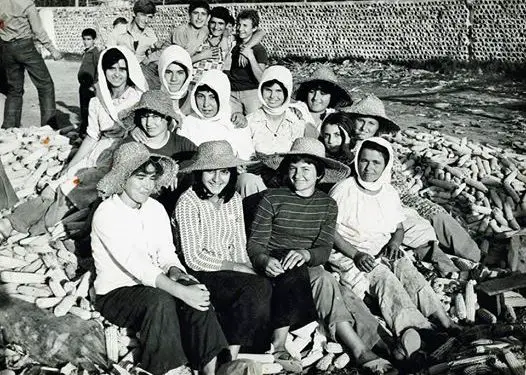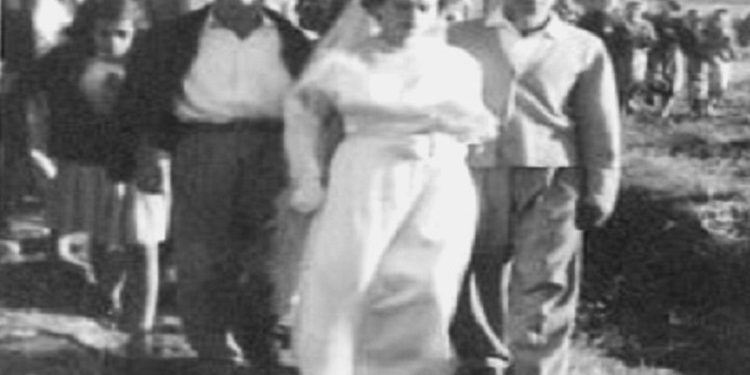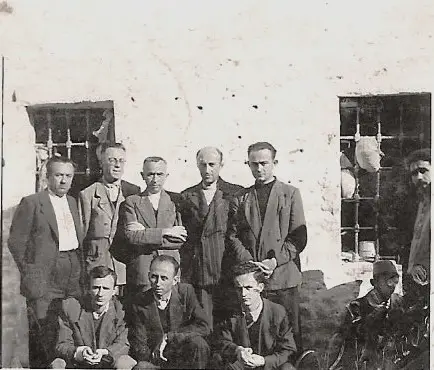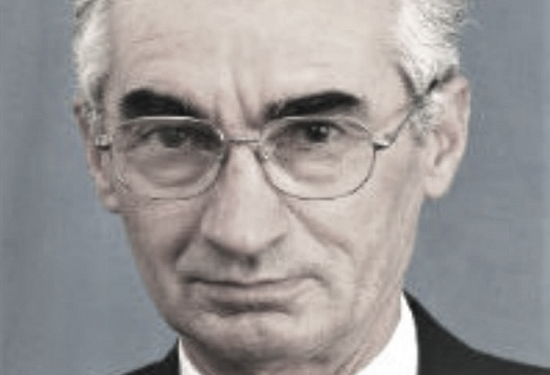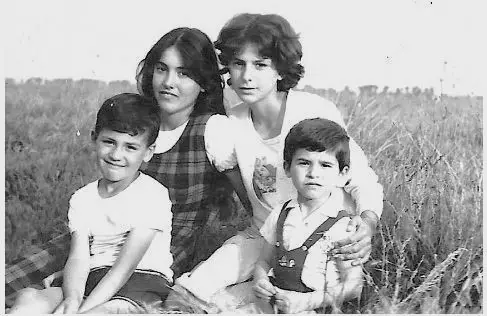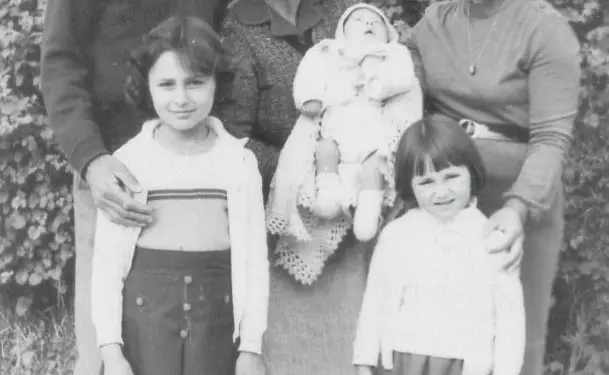From Ilo Photo
The third part
Memorie.al / Big families are named as such, because of prominent people, because of the wealth they owned and because of the influence they exercised in the social environment, at a given time. Historical turns have started from big families. Skanderbeg gathered the heads of large families in the Assembly of Lezha. Ismail Bey Vlora did the same. No union could be established without the will of large families, which were also called chimneys or gates. They had wealth, territory, and above all, they had the most knowledgeable people of the time, in a certain area.
Continues from last issue
He justified the sacrifice of the family; he graduated as an engineer with an excellent degree. He graduated not only for his family, but also for Albania. During the war, together with two friends who graduated in France, he founded an electrical company that dealt with electrical installations in Tirana and other cities.
But the events unfolded in such a way that Petrit was forced to archive his university degree and continue his life in the communist gulags, with his wife of Italian origin, Elena, and his only son, Eugene. Why? For the sole reason that his father was declared a traitor to the Fatherland, even though he served him, as explained above.
Under the conqueror, the Albanians either had to die slowly, or regenerate the progressive forces of survival. This was ensured by the Albanian governments of the occupation, who knew them, who spoke the same language, who were of the same blood. How they were treated by historiography is already known. History is not made by assumptions. Whoever exceeds the duty let him answer; this is the historic law that punishes delinquent governors of all political colors.
Although here we have a problem, not of the second order. Who has the right to do the review, who gives the grade? It took six years, which was more than a tenth of the average life time. It is enough time to judge anyone, with documents, evidence, and evidence.
Where did I find this degree of recognition for Mustafa Kruja (Merlika), when he was older than my father and I was educated in all stages of the Enverist School, where Mustafa Kruja was treated as the head of treason? This question arises naturally. For better or worse, I have followed most of the internment-deportation camps that operated on the former monist state farms with civilian work.
Some of these camps were more liberal, such as those of Libofsha, Shtyllas-Levan-Fier, Çermë (Tërbuf), Savra, and more conservative those of Gjaza, Pluk, Grabjani and especially Gradishta of Lushnja.In these camps, I worked hard, in the role of a specialist. I am familiar with the life of political exiles and those expelled from their homelands, to ensure that they do not escape to the west.
In these residences, I lived with my whole family, except Pluk. My life was different from the internees because I didn’t appear for appeals and I did lighter physical work than digging drainage ditches. I have extensively reflected the coexistence with exiles-deportees in my books. I am mentioning several tribes: Vrioni, Ndreu, Delvina, Kolonja, Toptani, Bitincka, Mile. I had friendships with many internees, whose intellectual level was much higher than mine and who had suffered and served the most brutal prisons of the dictatorship. I befriended them, not to say I fraternized.
There I learned that the history of Albania was very different from what I had learned in school. From their mouths, I learned who the real Mustafa Kruja was, which I clarified above. But the validation of those conversations that I had with some of those who had created trust in me, I have done by reading some of the books that have been published in these years, manuscripts or collections of writings, published in ten years.
I have known Mustafa’s son Petrit physically, but not in a direct working relationship. I adored Engineer Petrit from afar, as a living saint. To know who this man was, I am bringing to mind his portrait: average body, straight, serious, silent, and human. Followed the road from the house to the office – Pluk and back.
Before the workbench, he put on his cape and began milling cylinders and pistons, to regenerate the mechanical tools of the former farm. He received written orders and thus delivered them to the office manager. He did not communicate with anyone, within working hours, even outside of it.
I had tried to talk about some work problem in passing, but I was directed to the manager, Tune Harshorva. He did this communication with every employee who asked him, even the director. As I judge today, this was a kind of conviction. For that accidental state, you should also doubt yourself. But maybe it could also be a manifestation of the idea, of respecting the rules, with which he had been educated since childhood, in Italian colleges.
He never recognized me directly, despite the fact that I wanted this recognition, not to talk about his fellow prisoners, but to recognize in the conversation, a living human enigma. He spoke with his silence. It was silent protest. That silence spoke louder than any lecture. Petriti’s stay in Pluk – Lushnjë is an unrepeatable legend of an outstanding intellectual who lives in a sick environment.
That Lubi farm had over a thousand mechanical moving tools. One day if the tools didn’t work, the farm went bankrupt. The heart of the office that maintained the tools was the rectifier, a high-precision milling machine. A deviation, however small, in the rectification of the shirt cost the destruction of the engine.
Let’s be clear, not the rectification as an instrument, but its operator, turned the engine back to new. The precision of the engineer Petrit, separated the metal thread the length of the hair. Without Merlika’s certificate, the office could not function. The mechanical engineers confirmed this to me, and they confirm it today, in our conversations, here where we live.
Petriti and his family lived in exile in the agricultural town of Pluku, 5 km. far from Lushnja, where I was appointed in charge of the agricultural sector (1975-1978). In this sector I found an incandescent situation of class struggle. Two agronomists of the sector, out of three in total, were fired for political reasons.
They were my friends and fellow students. Donika Vrioni (Omari) was the mother of two children, but she lived without a salary, when even with a salary, it was difficult to survive. As to whom this lady was, the two surnames she carried are enough. Agronomist Javer Halili had been working on the farm for almost 28 years, but he was the brother of the kulak of Benca in Tepelena.
When this attitude was taken towards two senior specialists, free citizens, it is easy to understand what the behavior with the internees was. It was very difficult for me to doubt myself in the office chair and fellow students to suffer for a living. I had the firm that spent the money and provided work fronts for the workers, in a town of three thousand inhabitants. My two colleagues were out of work and I was not in a position to help them. I’m bored of life!
To put them back to work would make me antagonize the sector Party Bureau and the enterprise Party Committee, who actually made the law in the politically electrified township. Very busy was the emotional life in the harsh years of the class struggle. I continued to walk with them, in a space, so to speak, with chords, paved with nails.
I knew some of the interned tribes, such as the Barolles and the Kolčinaks, because I had lived close to them in Çerme (Tërbuf). Families unknown to me also lived here, such as the Kurt Kola family and many others. I learned that the Petrit Merlika family lived in this neighborhood. The family worked somewhere in the fourth field brigade.
I could not move workers from the fourth brigade to a homologous brigade, even though the legal authority said otherwise. Not only my duty, but every state duty, had a double meaning. You will work with your arms and think with the mind of the state. This was the dictatorship that ruled us.
Having accurate knowledge about the Merlika family, I felt sorry for Eugene, with a delicate physique, excellent graduate of Lushnja high school, every day he worked regularly in canals and other difficult agricultural processes. Most of the times I could not find him in the brigade, because he was at the work front. The brigadier told me that every day, he takes his belt and the book with him.
Uses every break, no matter how small, to study. He studied without interruption. He could not live without studying, but he studied without living completely free. Studying became second nature, part of his character. I never saw him on the streets. There was no question about the club.
Secondary school carries out the intellectual formation of a person. It instills in you the desire for further knowledge, because it teaches you that knowledge is endless. Higher school, mainly, gives a person professional specialization. Eugene was supplementing himself, with intensive individual study. To the excellent high school diploma, he was attaching a limitless universe of intellectual self-ability, and he managed to do it, in the most complete way possible.
In all the internment-deportation camps, in which I lived, I noticed that the free residents took care of, showed solidarity, and comforted the internees, silently and directly. I don’t remember a single fight, teasing, or a fight. It is not about crimes, even ordinary ones. Popular psychology is the noblest and most comprehensive.
If there is anyone I know who has totally challenged the lack of higher education, he is the researcher, publicist, analyst and historian, Eugjen Merlika. Even today, he reads more than he writes. This is evidenced by the scientific, linguistic and literary level of his work, written in the years of the restoration of pluralism in Albania. Eugeni is one of the most prominent firms of scholarly, historical, memoirs, literary criticism, and ruminations. All stand out for depth of thought, objectivity of analysis, human feeling and documented veracity.
An outstanding work of Eugene is the light he shed on the life and intellectual activity of Mustafa Kruja. He was not only the grandfather, but a signer of Independence, a staunch patriot, a pioneer of progress on the western road of the nation, an indomitable champion of its union, one of its most learned and representative men, a linguist , a historian, a publicist, a visionary and far-sighted politician, who unjustly struggled for 50 years, being called a traitor to the nation, by those who, even to his credit, surrendered the united nation, in the blink of an eye , Serbian communists.
Three generations of Albanians were educated with this spirit. It is not easy to disprove a well-thought-out and well-oiled, decade-old state fraud machine. Eugeni, like other serious researchers, helped to present the figure of Mustafa Kruja to the Albanians in its true light. Eugene continues to write and publish, in many genres.
He still hasn’t touched his maternal line, but he is working on the preparation of a volume of his grandfather, the well-known journalist, in the first quarter of the 20th century, the colonist Sotir Gjika, whose activity took place on many in the USA and in Italy, where he lived the last 15 years of his life, creating a family and obtaining Italian citizenship.
Eugene’s work is very reliable for generations, because it is the pen that was born, grew up and stood against Albanian Enverism, without compromise. He also writes about the fragile quarter-century-old democracy, which carries unforgivable flaws. The versions criticized and others proposed by Eugene are rarely found even in authors with names and ranks. It cannot be otherwise.
I did not imagine that Eugene would find the energy, knowledge and will to bring the ancestral family to the rightful place on the altar of large families, unjustly denied by communist brutality. I feel proud of Eugene, my former co-resident of Pluk in Lushnje. I thank Professor Thanas Gjika and publicist Roland Qafoku, who encouraged me to publish the thoughts, experienced for a long time, about the honorable Merlika family.
I don’t call it out of context, but I present some considerations for the respectable layer of the politically persecuted of communism with whom I have lived as a family. This oppressed layer had the worst fate in the Albanian communist society. In addition to suffering, they gave much to society through forced labor in public works. They created more than one Albania they found.
The leaders of the bodies of this layer have learned more about compensation than the opportunities that should have been created for the integration of the layer in politics and governance. The same attention should be paid to the cleaning of this layer from people who are ex-prisoners without political motives and without civic morals, which damage its image. Individual efforts, when combined, are highly effective. Eugjen Merlika demanded everything from himself, becoming an inspiring example for the whole class.
To put it bluntly: the mechanism must be found to place in leadership and legislative positions, really integrated people of this layer, including the educated descendants. This layer doesn’t just need compensation. It has been sacrificed for the European legal state. It must be made clear that the persecuted class values freedom, democracy more than anyone and really hates bad governance and corruption.
They paid the bill for marginal inequality. In these conditions, the aging generation must become conscious of handing over the baton to the erudite generation, mainly the integrated and educated persecuted. A reform program must be implemented to deny the bitter past of even this illusory transition. /Memorie.al




